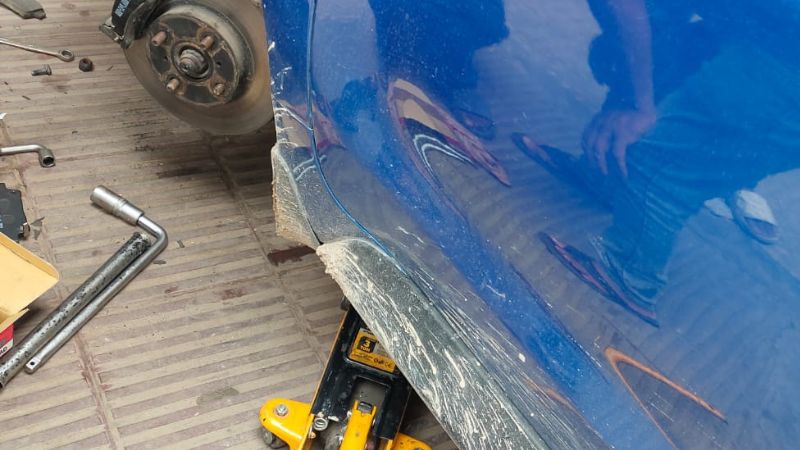As soon as you start your car you suddenly hear an annoying noise. How about the matter? Surely not very satisfying, is it? Maybe you’re not finding a stuck car noise clue or why it actually happens, right?
These annoying noises can be due to various reasons including faulty alternator, wheel bearing issues, faulty AC compressor, etc. But there is no reason to panic. You can solve these problems yourself very easily.
If you’re trying to find out why these annoying car noises happen, then this article is for you. We will try to discuss with you what are the most common causes of stuck car noise and how to fix them. So, let’s get started.

What Is Stuck Car Noise?
Stuck car noise refers to any strange sounds coming from your vehicle that wasn’t there before. Usually, it means something is wrong and needs attention.
The noise usually occurs when the car’s wheels struggle to spin freely. This results in increased friction or insufficient power transmission.
It is important to address and resolve the underlying problem immediately to prevent further damage and ensure safe vehicle operation.
With the right diagnosis and fixes, this annoying stuck noise can be solved easily. Also,
make sure to maintain your car regularly to prevent future issues and keep your vehicle running smoothly.
Common Causes of Annoying Stuck Car Noises
Did you ever get some strange noises coming from your car? Annoying squeaks, squeals or car window stuck grinding noises are usually a sign that something needs attention. Here are some of the common reasons behind those stuck car noises:
Worn Out Brake Pads
If you hear a high-pitched squealing sound when braking, your brake pads are probably worn down. It’s time for a brake job to replace the pads and avoid damage to the rotors.
Faulty Alternator
A squealing or whining noise that gets louder when accelerating could indicate a failing alternator. The alternator powers your vehicle’s electrical systems, so get this checked right away.
Issues with the Serpentine Belt
A squealing sound under the hood could be caused by a loose, worn, or damaged serpentine belt. The serpentine belt powers components like the alternator, AC compressor, and power steering pump. Have the belt inspected and replaced if needed.
Wheel Bearing Problems
A rumbling, grinding or whirring noise that gets louder at higher speeds is usually caused by a worn-out wheel bearing. Wheel bearings allow your wheels to spin smoothly, so worn or damaged bearings need to be replaced.
Other Potential Causes
A faulty AC compressor, bad water pump, transmission issues, or problems with the differential can also lead to annoying stuck car noises. It’s best to have the vehicle checked by a trusted mechanic to properly diagnose and fix the issue.
How to Fix Stuck Car Noise- Step-by-Step Guideline
When you hear a stuck car window noise, you should fix it as soon as possible. And in this case, you can take several steps.
Let’s find out how to get rid of this problem:
Locate the Source of the Noise
The most important thing is to determine where exactly the stuck noise is coming from. Park your car, turn off the engine, and listen.
See if you can isolate the area. Is it coming from the front, back, left, or right side of the vehicle? The wheel well, undercarriage or engine bay?
Identifying the source will help determine the possible causes and solutions.
Inspect for Debris
Trapped debris is a common culprit for stuck noises. Look for leaves, paper, rocks or other trash stuck in or around moving parts like the brakes, wheels, axles or drive belts.
Carefully remove any debris you find. It may solve the problem. So, start the engine to check if the noise is gone before moving on to the next steps.
Check the Brakes
Noisy brakes are a frequent issue. The brake pads or rotors may be worn down, damaged or stuck. Try lightly applying the brakes at different speeds to determine if the noise changes or goes away.
If the brakes seem to be the source, it’s best to have them checked by a mechanic as brake repair is a safety issue.
Inspect the Wheels and Axles
Jack up each wheel one at a time and spin to check for stuck or damaged components. Look for stuck lug nuts, damaged or bent rims, faulty wheel bearings, or CV joints. Replace or repair any stuck or damaged parts.
Tighten Loose Parts
A stuck noise can sometimes be caused by loose or unsecured components vibrating, rattling or grinding.
Check that the lug nuts, suspension components, heat shields, drive belts, and pulleys are securely fastened. Tighten as needed.
These are some of the steps you can follow to solve the car stuck noise issue. Try to follow them properly so that you can easily fix it.
Pro Tips to Avoid Stuck Car Noise Problems
Once you’ve fixed that annoying stuck car noise, you’ll want to take some steps to prevent the problem from coming back. Don’t worry, we can help you with that.
Check out these pro tips to avoid this annoying problem in the future:
Perform Regular Maintenance
The best way to avoid stuck car noises and other issues is to stick to the recommended maintenance schedule in your owner’s manual.
Get oil changes, tune-ups, tire rotations, and inspections done on time. Your mechanic can spot potential problems early and perform preventative repairs to stop noises before they start.
Drive Carefully
Aggressive driving puts extra stress on your vehicle’s components and can cause stuck noises to develop more quickly. Avoid rapid accelerations, heavy braking, and sharp turns when possible.
Go easy over bumps and potholes in the road. All of these driving habits will reduce wear and tear and help your car run more quietly.
Check Fluid Levels Weekly
Low fluid levels are a common cause of stuck noises. Pop the hood once a week to check that your coolant, power steering, brake, and windshield washer fluids are filled to the proper levels. Refill as needed to keep your vehicle running smoothly and avoid stuck noises.
Listen for Changes in Sound
Pay attention to the sounds your vehicle makes when operating normally. That way, you’ll notice right away if there are any new noises like squealing, grinding or rattling that could indicate a stuck component.
Have the new noise checked by a mechanic as soon as possible to minimize damage and avoid costly repairs down the road.
Keep Records of Repairs
Maintain good records of any repairs or maintenance done on your vehicle. That makes it easier to spot patterns if stuck noises become an ongoing issue.
Your mechanic can use the repair history to diagnose problems more quickly and accurately. Records also come in handy if you need to file a warranty claim for a stuck component.
By following these pro tips, you’ll keep your vehicle running smoothly with no annoying stuck noises to ruin the journey.
Frequently Asked Questions
Q. How to stop cars from making noise?
Before you fix this problem, you need to make sure where the sound comes from. After finding the source of the noise, you can go to the next step.
You can apply sound-deadening car mats or you can also update or replace worn rubber door seals. It will help you to stop cars from making noise.
Q. Why does my car sound like it’s scraping?
There are two main reasons responsible for sound like scraping or grinding. One is word-out brake linings and the other one is worn-out wheel/hub bearings.
Q. What to do when a car is stuck?
While your car is stuck, there are a few things you can do to fix it. You can accelerate forward a bit, then put your car in reverse and roll backward, then switch back to drive and accelerate forward again. Select the lowest gear for automatic transmission and the second or third gear for manual transmission.
Final Thought
While stuck car noises can be frustrating, the good news is many of the common causes are easily solved with some easy steps and basic tools.
With a little patience and persistence, you’ll be back on the road enjoying a quiet, peaceful drive in no time.
And now that you know how to avoid stuck car noise issues from happening, you can rest assured your vehicle will be running very smoothly for miles to come.


